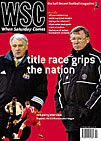 Matthew Garrahan examines how the potential collapse of a German media company could affect English football
Matthew Garrahan examines how the potential collapse of a German media company could affect English football
It is rare that English football has to take notice of what is happening overseas. The Bosman case overhauled the way players were bought and sold in 1995, but there have been relatively few instances since which have threatened similar instability. Until now.
The German media company Kirch Group, one of Europe’s largest, is facing a grave crisis, the effects of which may be felt for many years to come. At first glance, there is little to connect Kirch with English football. The company owns the pay-TV rights to the Bundesliga. It is selling the media rights to the 2002 and 2006 World Cups on behalf of FIFA. It also owns a sizeable chunk of Formula One rights.
Kirch’s problems stem from borrowing too much and investing too heavily in sports rights, which have failed to generate the anticipated returns. In England, investments on a similar scale have been made by BSkyB and ITV. Both have paid considerable sums for (Sky paid £1.1 billion for the live rights to the Premier League over three years, ITV is paying £315 million for Nationwide League coverage) but are likely to bid less next time. ITV is in such a state that it is understood to be trying to renegotiate the Nationwide contract.
If Kirch goes under, it will become the most high profile casualty of the sports rights boom. Companies like BSkyB will be able to point to its collapse to justify not hiking their bids for sports rights. If that happens, clubs will receieve less money and be unable to afford to keep players on lucrative contracts. The future of the Bundesliga itself, which is due to receive around £900 million from Kirch over the next three years, is unclear.
The Premier League is confident that it will be able to weather any storm. “BSkyB needs us,” says a spokesman. “We don’t anticipate receiving less money for the next contract.” True, BSkyB has relied on Premiership football to build its business. But if no other companies are bidding – and in the current climate that is a distinct possibility – it is difficult to see the company offering as much as last time.
The last high profile casualty of inflation in the sports rights market was ISL, the Swiss company which was FIFA’s main commercial partner. ISL overpaid for tennis rights, but its proximity to FIFA threatened the finances of world football. ISL sold the World Cup rights on behalf of FIFA, which would then pay the money to its member associations. When ISL collapsed, FIFA had to borrow to meet its obligations. FIFA replaced ISL with Kirch, and now the spectre of a similar cash crisis looms again.
FIFA says it is confident that all the money it expected from the sale of the 2002 rights has been paid by Kirch. It is far less sure about 2006. And here lies the problem. National broadcasters may be less inclined to pay the money that Kirch demands for the rights if they know the media company is on its knees and likely to accept any offer.
The crisis at Kirch has signalled a major readjustment in the sports rights marketplace. And there is a real possibility it will be felt as keenly here as in continental Europe.
From WSC 182 April 2002. What was happening this month